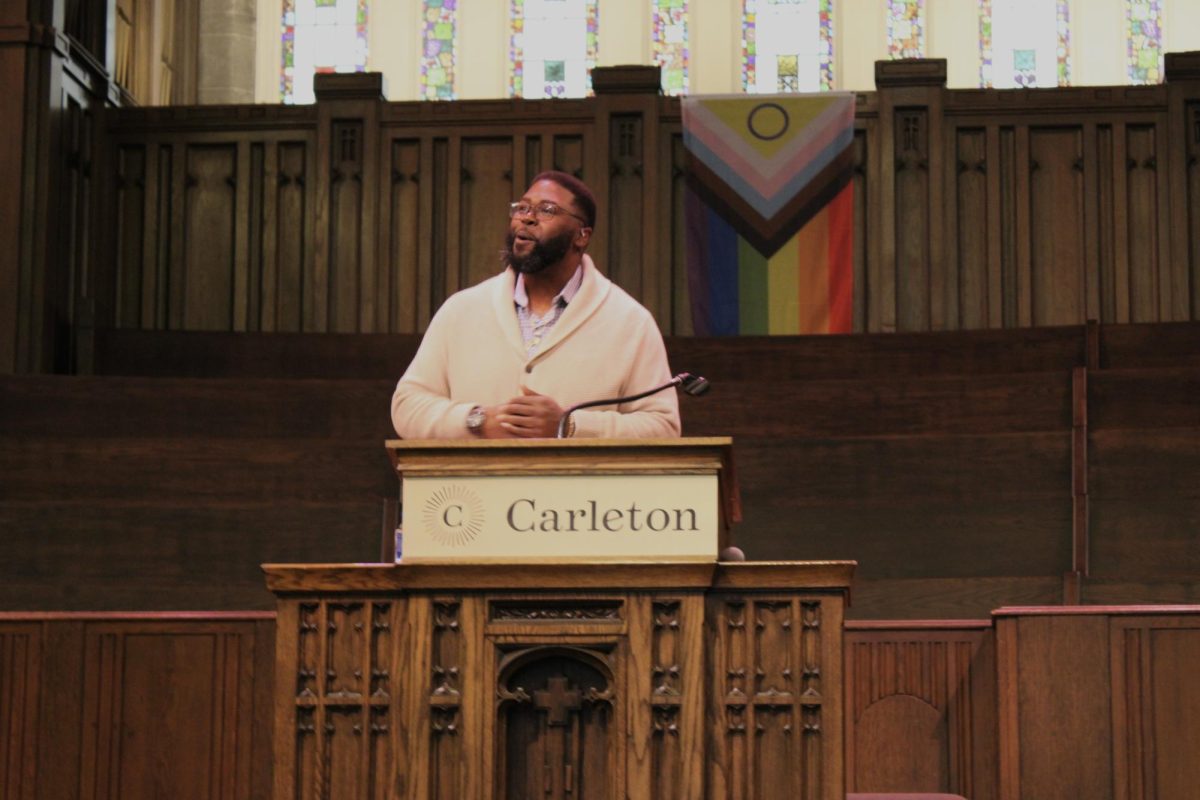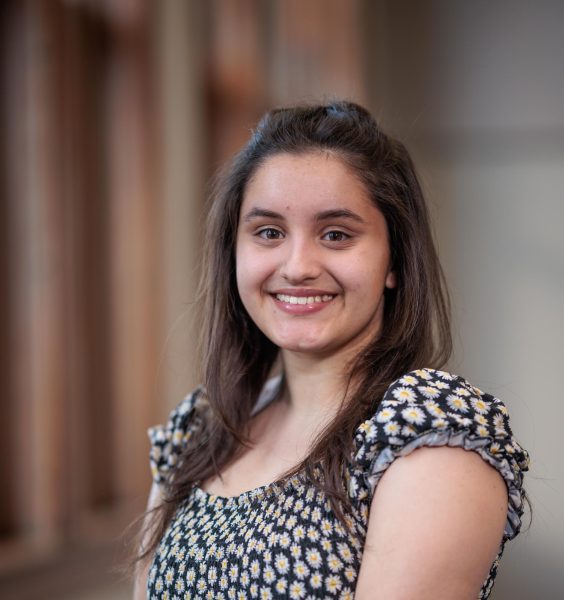On Jan. 5, 2023, Dr. Anthony Abraham Jack kicked off winter term’s convocation series with a powerful speech on the first-generation experience. Acclaimed author of “The Privileged Poor: How Elite Colleges are Failing Disadvantaged Students,” associate professor of higher education leadership at Boston University and faculty director of BU’s Newbury Center, his research has been cited by major publications from “The New York Times” to MPR. Jack explored what it means to be “forever first gen.” Writer, teacher and student, Jack drew upon all of these perspectives to complicate the prevailing understanding of first generation students at college.
Despite his impressive list of accomplishments, Jack came from humble beginnings. As he puts it, the first gen experience “is not just what I studied, it’s what I lived.” After being admitted as a first generation student into an elite college, Jack still faced hurdles his peers from higher socioeconomic backgrounds did not. “Rest was a luxury I thought I couldn’t afford,” Jack shared. Unlike his peers, who used the acronym “PJs” to refer to “private jets,” for Jack, there was “a whole lot of month at the end of the money.” While his classmate could call home for advice from parents who were familiar with what they were going through, Jack struggled to navigate a world full of “experiences [his] family didn’t know about and couldn’t afford.” Through his own story, Jack marked the difference between access to a college and actual acceptance into a college community. While Jack received the same acceptance letter as the rest of the students at Amherst College, while on campus, his acceptance into campus life and culture was limited.
Monica Law ’27, who introduced Jack at convocation, found similarities between her first gen experience at Carleton and Jack’s experience. “I didn’t realize I was first gen until I took my first class at Carleton. All these other people look like they know what they are doing. They have these other resources and were prepared,” said Law. “No one really prepares you on how to be the first gen.”
Building upon his lived experience, Jack has made the first generation experience his area of expertise, saying that the topic is “as much my profession as my personal passion.” Jack challenged his listeners to examine the axis on which we investigate poverty, arguing that present-day conceptions of the first gen experience are not delving into the complexities of reality. In his research, Jack identified two facets of the first gen experience: “the privileged poor” and the “doubly disadvantaged.” With the term “the privileged poor,” Jack describes first generation students who come from poor backgrounds but attended privileged highschools “where the money goes.” Conversely, the term “doubly disadvantaged” describes first generation students who attended poor high schools. In both of these settings, students have different access to social capital, defined by Jack as “those taken for granted ways of being that are valued in a particular context.” The privileged poor gain social capital as they navigate elite institutions during their secondary education, while the doubly disadvantaged are not given this opportunity. This distinction is important to understand why some first generation students flourish while others struggle. For Jack, one has to “understand where they’ve been to understand where they are going.”
The acknowledgement of the different backgrounds first generation students come from resonated with Law: “I feel like I was very disadvantaged from my high school. Him comparing first gen getting more help in comparison to those who didn’t made me feel like I wasn’t crazy. Just because you are under that label doesn’t mean you didn’t get more help.”
Jack recounted stories of other first gen students he encountered to illustrate the difference between the privileged poor and the doubly disadvantaged. For one interviewee from an underprivileged high school, “college contradict[ed] everything [she] knew at home.” Rather than hunkering down and doing everything herself, she was suddenly expected to reach out to professors and attend office hours, all of which seemed “intimidating” and “foreign.” In contrast, interviewees from affluent high schools shared how they felt “empowered” to go talk to their professors “just cause,” or because it was “just my right” to do so. They had gained comfort with authority figures from their experiences in high school, and this allowed them to access more resources.
In researching what universities are currently doing, Jack observed conditions that rewarded the privileged poor over the doubly disadvantaged: “We privilege privilege.” Jack identified a “hidden curriculum of making connections” where professors held unsaid expectations for students to be proactive. In essence, “the squeaky wheel gets the grease.” However, to continue this analogy, some of the wheels need grease, but they have never been taught to squeak. These skills of self-advocacy are never taught at poor high schools, where resources are stretched thin and teachers leave before the closing bell. The doubly disadvantaged are not aware of this expectation. This results in a reality where “first gen students are given secondary positions at first rate institutions.”
Rather than place the responsibility on first gen students, Jack’s call to action addressed elite institutions. Jack urged colleges to “be proactive in how [they] give help.” For first generation students, office hours can be a completely novel concept. To address this issue, Jack encouraged universities to “make codes explicit,” providing concrete examples such as defining office hours. Recognizing that “new students means new responsibilities,” Jack spoke from his present-day role as an educator at an elite college to assert that “we must be ready for the diversity we recruit” by going “beyond access to inclusion.”
Carleton has a special office, known as TRIO, which helps to address the needs of first generation students. Carleton’s TRIO/SSS program is part of an array of federally funded college access and college success programs that support students who are either low-income, first-generation, veterans, or students with disabilities. “Carleton’s TRIO program serves over 140 students annually,” said Kim Hildhal, Director of TRIO at Carleton. “Nearly 80% of the students we serve qualify as both low-income and first-generation.” This program offers a host of resources, including providing TRIO members with an individual advisor, support to create an Individual Success Plan (ISP) at the beginning of their freshman year, retreats, workshops and a textbook library. One important aspect of TRIO that Hildhal identified was how it “provides a safe space for students holding TRIO-eligible identities.” Law confirmed this when describing her own experience, sharing that TRIO was “the first place that made me feel welcomed at Carleton.” By letting Law know that “there’s people like me,” TRIO created a “safe space at Carleton.”
Hildhal is proud of the work she does, and the institution she does this work for. However, she also acknowledges that there is always potential for progress; “we can continue to improve this work. Some of the examples Dr. Jack gave in his talk are applicable not just at Carleton, but at any college or university. We can work to change our mindset from a deficit view to a resilience view and shine a light on the amazing assets our first-gen students bring to our community. Additionally, we can work to address the “hidden curriculum” of navigating a college campus by taking a universal approach to working with students. For example, we can mitigate our own biases by not making assumptions about students’ understanding of higher education and what it means to be a college student. These strategies can help us to make the college experience inclusive and equitable for all students. ”
Jack closed his speech by talking directly to the student body. “Reaching out isn’t burdening us,” he said. “It’s how you do college right.” Reframing a critical aspect of the student experience, Jack asserted that asking for help “is not a weakness but a strength,” as it shows one is smart enough to recognize when they are reaching the edge of their own knowledge. Jack also gave advice on how students should interact with college: “Demand as much from Carleton as it demands from you.” Familiar with how rigorous our terms can be, Jack encouraged students to match that energy with self-advocacy. Jack had other ideas of what self-advocacy could look like beyond asking for help: “Do not stand by as your stories are used to promote an image of a place that you know does not exist.” In closing, Jack built up to two simple words: “Be you.”














